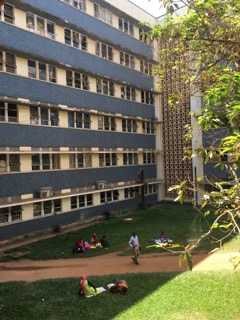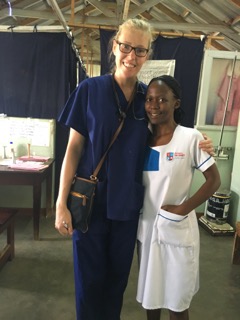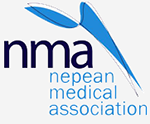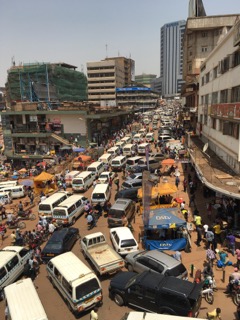2016
For my elective placement I spent eight weeks in Kampala, Uganda at Mulago National Referral Hospital. I do not even know where to begin to try and describe the incredible experience I had. My time was divided between cardiology, obstetrics and gynaecology and acute care paediatrics.

Mulago Hospital
I chose Uganda as an elective destination for several reasons, the first being that I was very keen to undertake a placement in a low resource setting. I wanted to expose myself to such an environment now, while I was young with few commitments. I wanted to make sure that I got a taste for working abroad and to ensure that I remain inspired to contribute to improving the health of the global community, even when life starts to get busy and I have a family etc. I wanted to challenge myself, meet new people and I wanted to witness a completely different perspective on health care. Uganda did not disappoint me.
Uganda is a remarkably poor country with a dense population of 36 million people, most of who live in rural areas. Therefore the patient population at Mulago was predominantly made up of rural patients, many of who had travelled quite a distance from their rural villages. Uganda’s public health care system provides free medical services but with exceptions. Patients would have to pay for certain investigations such as imaging and ECGs as well as any medications they were prescribed. The consequences of which meant the Ugandan medical officers had excellent clinical skills but many patients were still left without an accurate diagnosis or without any appropriate treatments.
It was a very interesting time to visit Uganda, I arrived early January and federal elections were to be held in late February. The current president, Yoweri Museveni, had played an integral role in saving the people from Idi Amin and Milton Obote and had now been in power for 30 years. At 71 years of age, Museveni had announced to stand again for President at the elections. After speaking to many local people, most were happy for Museveni to remain in power as the last 30 years had been a peaceful time for the country however there was a strong opposition movement, lead by, Kizza Besigye, a physician who had worked closely with Musevini as his private doctor. We had been warned to leave Kampala during elections for safety reasons and there were concerns that if Museveni lost the election that there might be a military coup. Polling day proved to be relatively peaceful, albeit corrupt. However, it was one day, a week before the elections that I will remember forever.
I had just started my 6th week at Mulago and my first day on the paediatric acute care ward, which turned out to be my favourite rotation. The presentations were unlike anything we would see in Australia, malaria, sickle cell vaso-occlusive crisis, malnutrition, heart failure, severe anaemia and sepsis. In the afternoon of my first day a 13-year-old boy presented with his mother with fever, vomiting and confusion. He had cerebral malaria and he quickly declined and was having seizures and long apneas. There was no oxygen available at the time, as other patients were using it. The young boy vomited and aspirated and we soon realized that there was no suction at hand. A nurse went in search of one.

Melissa with a mid-wife
Meanwhile outside the hospital I could hear screams and shouting and gunshots. Besigye, the main contender to Museveni had just been arrested. He was due to speak at a political demonstration at Makerere University, where I was living during my time in Kampala, just as Museveni had done the Friday before. There had been an announcement earlier that day that political demonstrations were no longer permitted after dark, even though Museveni’s demonstration, held 3 days before, was in the evening, after dark. Besigye had been pulled over in his car and was told he would be arrested if he continued to drive on the main road towards the University as it was not to be used by him, for risk of causing traffic jam. Besigye, now aware of loosing daylight hours decided to hop out of his car and walk to the University. Police then arrested him and he was unable to speak at the demonstration. Consequently a riot ensued and this is what I could hear from my ward at Mulago. Mulago is only two kilometers from Makerere University.
Back on the ward the nurse returned with suction but there were no power points around the bed of the child we were treating. We had to play Tetris with the other patient’s beds in the ward to be able to plug in and operate the suction. The young boy did not resume breathing after his last seizure and I started chest compressions while the doctor was suctioning his airways. There were no IV poles on the ward and the young boy’s mother was holding his IV fluids and was a stone-faced witness to her son’s management.
Outside in the distance it sounded like bombs had started to explode (tear gas) and gunshots were being fired. My mobile phone was in the top pocket of my coat and I could feel it vibrate as other medical students were ringing to make sure that I was still at the hospital and to inform me not to return home just yet. All the while I was still compressing this young boy’s chest as his mother stood so close to me and watched on. The young boy died. A Makerere student also died, he was shot dead by police during the riot that I was listening to from the ward.
My eight weeks at Mulago exposed me to more than just another side of medicine and pathology we do not see here in Australia. I learned so much from the Ugandan medical staff. My clinical skills have improved and I am trying hard to limit my waste at home and in the hospital. Ugandan’s are so resourceful and are able to accomplish much with little, a skill I think that would benefit most populations and the environment. It gave me the opportunity to live and participate in a culture that is so unlike my own. I met so many incredible people from all over the world, many of who were international doctors conducting research or volunteering their time to help educate the Ugandan medical staff and students. It was such an invaluable experience; it most definitely will not be my last in Uganda.
I would like to thank Nepean Medical Association for helping me finance my elective. I am unbelievably grateful to be given such an opportunity to be involved in this placement. The University of Sydney has a great relationship with Makerere University and I felt very privileged to be able to represent both the University of Sydney and Nepean Medical Society and to continue to highlight their presence in the global healthcare community.






